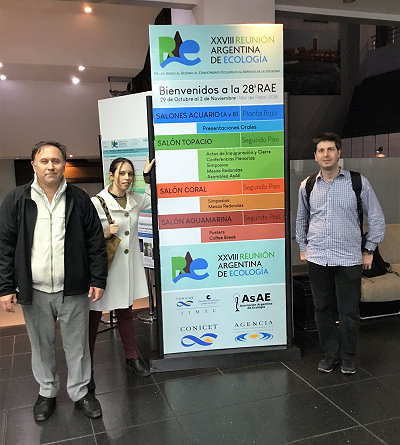 Penélope Quirino, a biology major at the University of Belgrano, presented her work "Contribution to the knowledge of the fish communities of the Río de la Plata through sport fishing", at the 28th Ecology Meeting in Argentina, held recently in Mar del Plata, from October 29 to November 2, 2018. It is a biannual event, organised by the Argentine Association of Ecology, in which more than 600 researchers, including from abroad, meet to discuss and share their research conducted in the field of ecology.
Penélope Quirino, a biology major at the University of Belgrano, presented her work "Contribution to the knowledge of the fish communities of the Río de la Plata through sport fishing", at the 28th Ecology Meeting in Argentina, held recently in Mar del Plata, from October 29 to November 2, 2018. It is a biannual event, organised by the Argentine Association of Ecology, in which more than 600 researchers, including from abroad, meet to discuss and share their research conducted in the field of ecology.
The work presented by the Fisher's Club, Mundus maris and the University of Belgrano was achieved thanks to the participation of the sport fishers, both from the Central headquarters and the Paraná Guazú headquarters of the Sport Fishers Club of Argentina, who allowed Penelope to collect the necessary data, such as total length of the fish, identification of the species and type of bait, among others.
These records allowed to initiate the first analyses that will contribute to better understand the community dynamics of the fish. During her field work, Penelope was also able to engage in enriching dialogues that contributed to a better understanding of the sport fishing reality. A survey conducted via email was another great contribution that sport fishers offered to this work, with a number of complete answers high enough to later perform statistical analyses and graphs, which were shown in the slides of her talk. The interviews with some fishermen and the additional comments provided in the surveys made it possible to complete the analyses taking in as well the questions of some interested colleagues.
 The majority of fishermen declared a return of all species, except for the silverside (Odontesthes bonariensis), which has the highest retention rate. The results of the survey also showed Dorado and Common carp with quite coincident occurrences for the months of January and February. The free declarations of the sport fishers showed their clear conviction of the negative effects of the urban drains near the Headquarters of the Club de Pescadores on the local fish community.
The majority of fishermen declared a return of all species, except for the silverside (Odontesthes bonariensis), which has the highest retention rate. The results of the survey also showed Dorado and Common carp with quite coincident occurrences for the months of January and February. The free declarations of the sport fishers showed their clear conviction of the negative effects of the urban drains near the Headquarters of the Club de Pescadores on the local fish community.The strong applause after the dissertation was combined with congratulations from the public of colleagues for valuing the knowledge of the fishers and for the effort put in to rigorously collect all the data during the field work.
Our thanks to Mundus maris and the University of Belgrano for supporting us, and to the Sport Fisher's Club for giving us the opportunity to stay at the wonderful venue of Santa Clara del Mar. It was a truly successful and memorable experience (see the video).








